McMinn County, TN

Beth Salem Presbyterian Church
McMinn County was founded from land ceded from the Cherokee nation through the Calhoun Treaty 1819. Many families moved into the area with the population increasing to 14,000 by 1830, with an estimated slave population of 1,250. The county is rich in its Black history from communities, to schools and businesses.
Below includes more of the Black History in the County based on respective cities.
Location of Black schools, McMinn County, 1935-1936
Study of Local School Units, Prepared by the United States Office of Education in cooperation with the State Department of Education, Nashville, TN

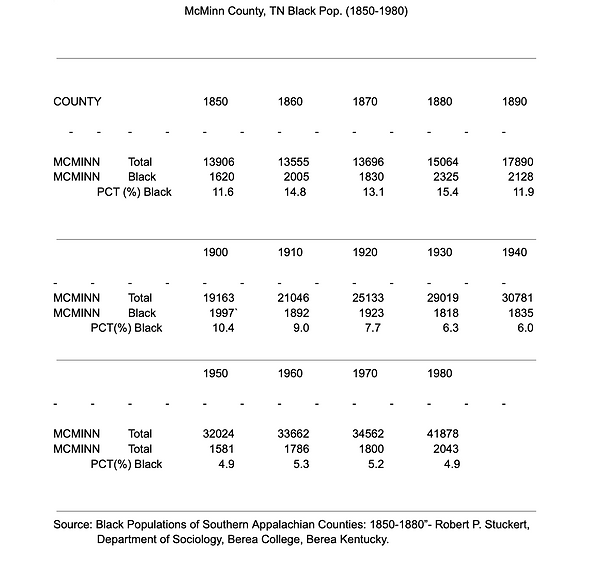
This page will update as more information is gathered. To provide anymore information please contact Precious Brown at precious@blackinapplachia.org.
ATHENS
Athens was established in 1822. Athens has a rich history with its Black communities such as the Rosenwald school J.L. Cook and Free Hill, a self sustained Black community affected by Urban Renewal. The city has several historic Black churches including First Presbyterian and St. Mark AME Church.
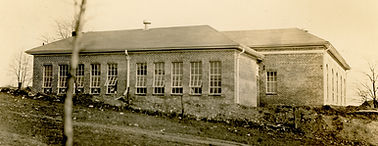
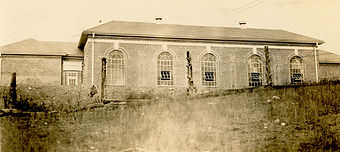
J.L Cook School Athens, TN
Jacob Lincoln Cook was a preacher in the city of Athens, Tennessee where he established the First Presbyterian Church which is an all Black institution. Within his church, Cook started a small school called the Academy of Athens (Also known as the Athens Mission for the Colored People). The United
Presbyterian Church’s Freedman Board financially supported the institution by providing $2000
to $2500 a year. Cook had the assistance of several community members whose names were Ms.
Henerietta Mason, Miss Mary Byars, Miss Fannie Jackson, Mister James Cleage, and Professor
Pitts. The school served grades 1st through 12th with the elementary being in a separate section
than high school. To learn more click on History of Cook Park.
CALHOUN
Founded in 1820 by John Walker, Calhoun was the first incorporated town in McMinn County. The town had both a Freedman Bureau and Rosenwald School.
After one of the historic burial grounds of Calhoun's Black community was taken & developed over, the families of Mt. Lebanon Missionary Baptist Church established another cemetery, adjoining their church. View the interments of Mount Lebanon Missionary Baptist Church Cemetery here.
Britton School (aka Union School) was located on county road 733. The school was funded by the Rosenwald Foundation. There is also documentation of a Freedman Bureau School in Calhoun,TN.




ETOWAH
This small town was founded in 1922. It began to get heavily populated from the introduction of the L&N (Louisville and Nashville) railroad. Many started migrating to the area with the creation of new communities, several being Black communities. These communities include Parkstown, East, New Salem, and the Holler. The area had two Rosenwald schools, East and West (Parkstown) Etowah.
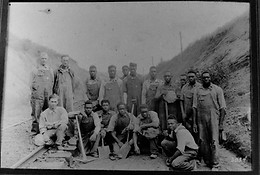
Workers for the L&N Railroad. Etowah, Tenn
In 1902, the Louisville & Nashville (L&N) Railroad established a system in the area. The Depot took up 1454 acres and had 15 rooms. Many Black workers from Mississippi and Alabama came to work on the new railroad. The railroad also used convict leasing to assist in building the L&N. The building was segregated, having both white and Black waiting rooms and ticket windows. The railroad brought in an influx of workers and their families to Etowah. With the growth of the Black population came new communities. Parkstown, The Holler, and East were the areas where Black families moved when coming to Etowah. Click Parkstown to learn more.

Parkstown (West Etowah) School
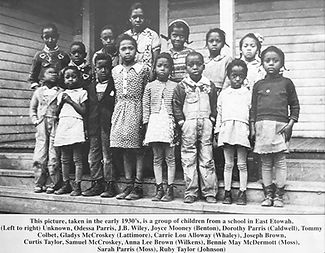
East Etowah School

Star Bethel Baptist Church- Etowah TN
NIOTA
Niota was founded in the 1850s and first referred to as Mouse Creek. The Depot has been previously used as a slave auction and has held a few plantations. The town houses the historic Lanetown Community and School which were established by formerly enslaved African Americans.
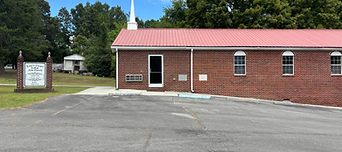
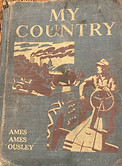
Lane's Chapel A.M.E. Zion Church
Textbook used at the Lanetown School


Lanetown School- Niota Tennessee

RICEVILLE

Black Church Adjoining Cemetery

Newspaper mention of Riceville's Black School
Riceville is located right between Athens and Calhoun in East Tennessee. The town held a large Black community and a segregated graveyard that can still be visited today. Beside the graveyard where African Americans are buried resides a church previously owned by four African American men in the 1880s. The men, Wesley Phillips, Fowler Fowler Phillips, Henry Haney, and ???, bought the church from a liberal white reverend named James H. Lowry. The church denomination was baptist, however the name of the church is still unknown. Family names that lived in town were Caldwells, Matlock, Pecks, Porters, Sheelers, and more. To learn more information about Riceville check out the links below.